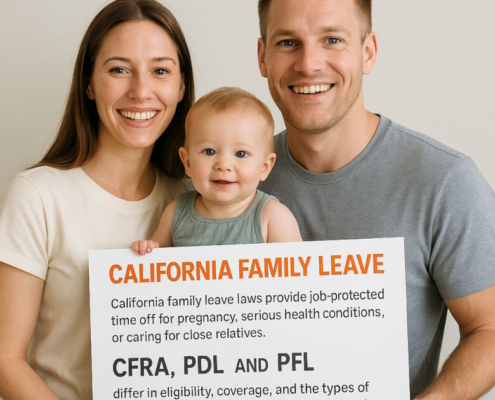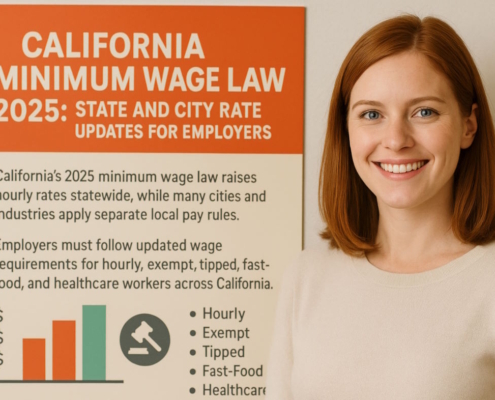Former employer sabotaging new job
If your former employer is sabotaging your efforts to get a new job, you must know if you have a claim. This page will discuss what is required to file a lawsuit against your former boss.
By Brad Nakase, Attorney
Email | Call (888) 600-8654
If you suspect your former employer is sabotaging you from getting another job, you must determine if you can sue your former employer. In this article, our attorney for workers discusses employer’s liability for sabotaging an employee from getting another job as follows:
Who does Labor Code section 1050 apply to?
Liability extends to the employer, its agents or its officers. (Cal. Lab. Code, §1050.) It also applies when the misrepresentation is made by a superintendent, manager, or other employee of the employer, and the employer “knowingly causes, suffers, or permits” that person to make the misrepresentation. (Cal. Lab. Code, § 1052.)
In addition to the employer, an agent or officer of the employer may also be individually liable. (Cal. Lab. Code, § 1050.)
Misrepresentations by employee’s union or its officers are not actionable because the union is not an employer. (Breitegger v. Columbia Broad. Sys., Inc. (1974) 43 Cal.App.3d 283, 293 [“The terms of section 1050 refer only to misrepresentations by the former employer.”].)
“Section 1054 provides for a damage remedy for the party aggrieved by a violation of the section 1050 prohibition against an employer blacklisting a former employee. It is patent that the aggrieved party must be the blacklisted employee, not a union, since the latter can neither be fired nor quit.” (Service Employees Internat. Union, Local 193, AFL-CIO v. Hollywood Park, Inc. (1983) 149 Cal.App.3d 745, 765.)
Can I sue my former employer for sabotaging my getting a new job?
To prove that your former employer is liable for damages by sabotaging you getting another job, you have to prove the following things:
- That after your employment with former employer ended, your former employer made a misrepresentation to a prospective employer about you;
- That your former employer knew the representation was not true when he made it;
- That your former employer made the representation with the intent of preventing you from obtaining employment; and
- That you were harmed and that your former employer’s conduct was a substantial factor in causing Paula’s harm.
Element 1: Misrepresentation Regarding Former Employee
You must prove that your former employer made a misrepresentation that is untrue. (Cal. Lab. Code, § 1050.)
The misrepresentation must be about employee, not his union. (Service Employees Int’l Union v. Hollywood Park, Inc. (1982)149 Cal.App.3d 745.)
The misrepresentation must be about a former employee. (Cal. Lab. Code, § 1050.) This rules applies regardless of whether the employee was discharged by the employer or whether the employee voluntarily left. (Ibid.)
An employer cannot be liable if the misrepresentations are only communicated to the employee’s former co-workers. Kelly v. General Tel. Co., 136 Cal. App. 3d 278 (1982). “Labor Code section 1050 applies only to misrepresentations made to prospective employers other than the defendant … [T]he Legislature intended that Labor Code section 1050 would apply only to misstatements to other potential employers, not to misstatements made internally by employees of the party to be charged.” (Kelly v. General Telephone Co. (1982) 136 Cal.App.3d 278, 288-289.)
Element 2: Knowingly Made Misrepresentation
The misrepresentation must knowingly be made to a prospective employer. (Cal. Lab. Code, §§ 1050, 1052)
Element 3: Intent to Prevent or Attempt to Prevent Subsequent Employment with a Prospective Employer
A communication without malice solicited by a prospective employer from a former employer would be privileged in accordance with Civil Code section 47(c).
Prima facie evidence of a violation of Labor Code section 1050 exists either where: (1) an employer provides a statement of reasons for the termination of an employee’s employment or otherwise furnishes such information to a prospective employer without a special request; or (2) if upon a special request from a prospective employer for a statement concerning the reason for the termination of an employee’s employment, the employer furnishes such a statement but includes a mark, sign, or other means of conveying information different from that expressed by the words therein. (Cal. Lab. Code, § 1053.)
Element 4: Causation and Damages
You have to show that your former employer’s misrepresentation caused you damages. Traditional notions of tort damages determine whether the harm caused was foreseeable and the damage proximately caused.
Remedies
- Compensatory Damages. An employee is entitled to compensatory damages; however, an employee is only entitled to recover once for misrepresentation, even if both corporate and individual supervisor are found liable for misrepresentation. (De Anza Santa Cruz Mobile Estates Homeowners Assn. v. De Anza Santa Cruz Mobile Estates (2001) 94 Cal.App.4th 890, 912.
- Statutory Penalties [Treble Damages]. Labor Code section 1054 provides that a successful plaintiff is entitled to treble damages (i.e., damages in an amount triple plaintiff’s lost earnings and benefits, and any other actual damages plaintiff might suffer); however, plaintiff must choose between either treble damages under Labor Code section 1054 or compensatory and punitive damages under Labor Code section 1050. (De Anza Santa Cruz Mobile Estates Homeowners Assn. v. De Anza Santa Cruz Mobile Estates (2001) 94 Cal.App.4th 890, 912.)
- Punitive Damages. Employee may recover punitive damages.“‘The primary purpose of punitive damages is to punish the defendant and make an example of him.’ Since this purpose is the same as the treble damages authorized by Labor Code section 1054, we do not sanction a double recovery for the plaintiff. In the new trial on damages, the jury should be instructed on the subject of punitive damages based on malice or oppression. Any verdict finding compensatory damages must be trebled by the court. Plaintiff may then elect to have judgment entered in an amount which reflects either the statutory trebling, or the compensatory and punitive damages.” (De Anza Santa Cruz Mobile Estates Homeowners Assn. v. De Anza Santa Cruz Mobile Estates (2001) 94 Cal.App.4th 890, 912.)
- Criminal Penalties. An employer who makes such a misrepresentation is guilty of a misdemeanor. (Cal. Lab. Code, § 1054.) If the employer knowingly causes or permits its agent, superintendent, manager, or employee to make such a misrepresentation, the employer is likewise guilty of a misdemeanor. (Cal. Lab. Code, § 1052.)
Affirmative Defenses
- Statute of Limitations. The statute of limitations is one year from the date of the discovery of the misrepresentation. (Cal. Civ. Proc. Code, § 340, subd. (1) [Although the statute of limitations for misrepresentation is generally three years, due to statutory nature, Code of Civil Procedure section 340 applies].)
- Absolute and Qualified Privileges. The same privileges available to an employer in a defamation action (Civil Code, § 47) are available under section 1050. (Espinoza v. City of Imperial (S.D. Cal., June 10, 2008, No. 07cv2218-LAB (RBB) 2008 WL 2397430.
- Truthful Statement about former employee. If, upon special request, the employer provides a truthful statement of the reasons for the discharge of an employee or the reasons why the employee voluntarily left, such statements are not actionable. (Cal. Lab. Code, § 1053.)
Have a quick question? We answered nearly 2000 FAQs.
See all blogs: Business | Corporate | Employment Law
Most recent blogs:
Contact our attorney.
































